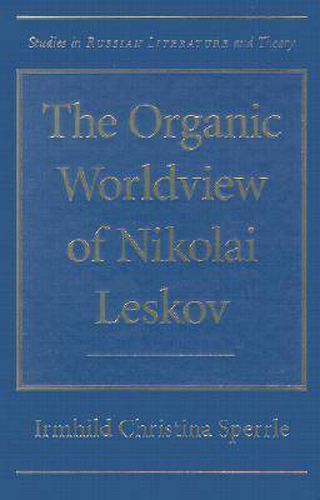Readings Newsletter
Become a Readings Member to make your shopping experience even easier.
Sign in or sign up for free!
You’re not far away from qualifying for FREE standard shipping within Australia
You’ve qualified for FREE standard shipping within Australia
The cart is loading…






Although little studied in the West, Nikolai Semenovich Leskov (1831-95) is accorded a place among major nineteenth-century writers in his native Russia. Irmhild Christina Sperrle’s The Organic Worldview of Nikolai Leskov draws on previously unavailable archival and primary sources to offer English-speaking readers the opportunity to appreciate the work of this neglected author. Leskov remarked to his contemporary Anatolii Faresov,
People talk about my ‘language,’ about its colorfulness and its national traits; about the richness of my plots, about my condensed way of writing, about ‘similarity’ and so on, but they do not notice the most important thing.
It is this
most important thing,
Leskov’s consistent thematic adherence to an
organic
philosophical model, that Sperrle traces and elaborates here. Focusing on movement and transformation in
an organic manner
- a manner in which death and rebirth alternate and condition each other - Sperrle develops Leskov’s notion of organicity and explores his relationship to the organic tradition in philosophy and literature. Her reading of key texts among his more than five hundred works entails a close look at Leskov’s ideas about the Divine as freedom of belief, about truth as a continual renewal of previously held theories, and about death in both a physical and a spiritual sense. She examines Leskov’s vexed relation to Tolstoyan ideas and shows how the notion of heresy - as a questioning rather than rejection of authority - is a crucial element in his worldview and his work.
$9.00 standard shipping within Australia
FREE standard shipping within Australia for orders over $100.00
Express & International shipping calculated at checkout
Although little studied in the West, Nikolai Semenovich Leskov (1831-95) is accorded a place among major nineteenth-century writers in his native Russia. Irmhild Christina Sperrle’s The Organic Worldview of Nikolai Leskov draws on previously unavailable archival and primary sources to offer English-speaking readers the opportunity to appreciate the work of this neglected author. Leskov remarked to his contemporary Anatolii Faresov,
People talk about my ‘language,’ about its colorfulness and its national traits; about the richness of my plots, about my condensed way of writing, about ‘similarity’ and so on, but they do not notice the most important thing.
It is this
most important thing,
Leskov’s consistent thematic adherence to an
organic
philosophical model, that Sperrle traces and elaborates here. Focusing on movement and transformation in
an organic manner
- a manner in which death and rebirth alternate and condition each other - Sperrle develops Leskov’s notion of organicity and explores his relationship to the organic tradition in philosophy and literature. Her reading of key texts among his more than five hundred works entails a close look at Leskov’s ideas about the Divine as freedom of belief, about truth as a continual renewal of previously held theories, and about death in both a physical and a spiritual sense. She examines Leskov’s vexed relation to Tolstoyan ideas and shows how the notion of heresy - as a questioning rather than rejection of authority - is a crucial element in his worldview and his work.